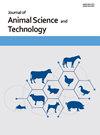Effect of grain vinegar feeding on milk production and fatty acid profile of Holstein cows
IF 3.2
3区 农林科学
Q1 AGRICULTURE, DAIRY & ANIMAL SCIENCE
引用次数: 0
Abstract
Incorporating organic acids into cattle feed should be carefully considered because dietary organic acids may affect voluntary feed intake and rumen fermentation. We conducted a feeding trial for the practical evaluation of grain vinegar. Lactating Holstein cows (n = 19) were divided into two groups, then were subjected to each of two treatments in a crossover design. The rumen fermentation parameters, blood urea nitrogen and NEFA, milk composition, and milk fatty acid content were analyzed. No notable changes were observed in rumen fermentation parameters or blood metabolites. Corn silage intake, milk production, and 4% FCM were not affected by vinegar supplementation. The proportions of fatty acids in milk originating from de novo synthesis in the mammary gland were 25.2% and 25.4% in control and vinegar-fed groups, respectively. The levels of branched-chain fatty acids iso-C14:0, iso-C15:0, and iso-C16:0 were substantially decreased by vinegar supplementation, are known to be related to rumen environmental stress. This study showed that feeding grain vinegar to lactating dairy cows had no effect on feed intake, rumen fermentation, or milk production, although the proportion of some branched-chain fatty acids in the milk decreased.食醋饲喂对荷斯坦奶牛产奶量和脂肪酸分布的影响
在牛饲料中添加有机酸应慎重考虑,因为饲粮中的有机酸可能影响自发采食量和瘤胃发酵。为了对谷醋进行实用性评价,我们进行了饲养试验。将泌乳荷斯坦奶牛(n = 19)分为两组,采用交叉设计进行两种处理。分析瘤胃发酵参数、血尿素氮和NEFA、乳成分和乳脂肪酸含量。瘤胃发酵参数和血液代谢产物无显著变化。添加醋对玉米青贮采食量、产奶量和4% FCM均无影响。对照组和醋饲组乳中来自乳腺从头合成的脂肪酸所占比例分别为25.2%和25.4%。支链脂肪酸iso-C14:0、iso-C15:0和iso-C16:0的水平在添加食醋后显著降低,这与瘤胃环境应激有关。本研究表明,饲喂谷醋对泌乳奶牛采食量、瘤胃发酵及产奶量均无影响,但乳中部分支链脂肪酸比例有所降低。
本文章由计算机程序翻译,如有差异,请以英文原文为准。
求助全文
约1分钟内获得全文
求助全文
来源期刊

Journal of Animal Science and Technology
Agricultural and Biological Sciences-Food Science
CiteScore
4.50
自引率
8.70%
发文量
96
审稿时长
7 weeks
期刊介绍:
Journal of Animal Science and Technology (J. Anim. Sci. Technol. or JAST) is a peer-reviewed, open access journal publishing original research, review articles and notes in all fields of animal science.
Topics covered by the journal include: genetics and breeding, physiology, nutrition of monogastric animals, nutrition of ruminants, animal products (milk, meat, eggs and their by-products) and their processing, grasslands and roughages, livestock environment, animal biotechnology, animal behavior and welfare.
Articles generally report research involving beef cattle, dairy cattle, pigs, companion animals, goats, horses, and sheep. However, studies involving other farm animals, aquatic and wildlife species, and laboratory animal species that address fundamental questions related to livestock and companion animal biology will also be considered for publication.
The Journal of Animal Science and Technology (J. Anim. Technol. or JAST) has been the official journal of The Korean Society of Animal Science and Technology (KSAST) since 2000, formerly known as The Korean Journal of Animal Sciences (launched in 1956).
 求助内容:
求助内容: 应助结果提醒方式:
应助结果提醒方式:


